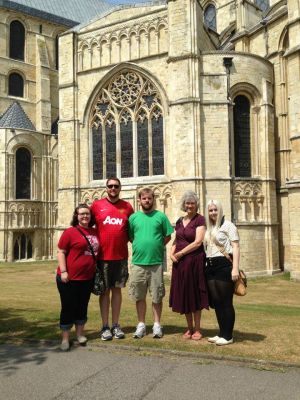London trip offers worldly perspectives
August 22, 2013
The English and history departments studied abroad in London for the July intersession. While there, students were able to participate in cultural and historical exploration and satisfy academic credits.
“One of the important things that the students have to do before we even leave is come up with a formal proposal for a research project,” said English professor Lesley Peterson. “We are very much in guidance and support roles rather than instructors.”
Peterson and Jeffrey Bibbee, associate professor of history, said the experience is not solely about the work, but rather the personal ideas the work incites.
“On any given day [in the British Library] there are about 2,500 researchers in the building,” Bibbee said. “That includes our 11 students, Nobel prize winners, people who have been recognized as absolute leaders in literature and art, music, history – every discipline under the Sun.
“Literally some of the best minds in the world are there in that summer. And when our students can realize ‘Yes, I am allowed to be here, too, and to work alongside these people as peers,’ it’s a really exciting moment.”
Bibbee and Peterson emphasized that students were allowed to wander freely through the campus they stayed on, with a flexible schedule of events and sightseeing pre-determined by the professors. In their free time, students were able to take initiative to build their own experiences and walk away with a strong sense of self-satisfaction.
“The moments that captured my heart were the moments in which I walked the city streets alone and talked to other people living in or visiting London for various reasons,” said student Whitney Berryman. “Meeting people from Milan, Madrid, San Francisco and many other places was such a joy for me. Navigating my way through the city gave me a feeling of independence and capability that I did not expect. I truly thought that I would stay lost the whole time, but by the end of the month, it seemed as if I had lived there for years.”
Students who traveled to London gained knowledge of research and writing, but also gained appreciation for students on their own campus.
“I think that sensitivity comes with the knowledge of the world being a big place,” Bibbee said. “The diversity that [the students] experience there lets them see multiple perspectives, multiple cultures, religious traditions and political philosophies that, when you have a student that comes into a certain place, [proves] how new everything can be. They go through that and I think it makes them far more understanding of our international students’ experience here.”
According to Associated Colleges of the Midwest’s Project Proposal, studying abroad, in general, increases the ability to reason, increases the capacity for effective action and increases self-reflective insights.
“The important thing to realize is that it’s not just an expense, it’s an investment,” Peterson said. “I believe that this is, and will continue to prove, useful to students in getting jobs, getting scholarships, getting into good graduate schools. It’s an experience that not a lot of people have and it sets you apart.”
Though the expenses can seem lofty for a college student at $6,300, the cost is actually relatively low, Peterson said. Group rates, past experiences and university residence allows for the cheapest trip without compromising experience.
“You can come up with the money,” Bibbee said. “Don’t let that prevent you. Figure out what you want to do, set a goal, make it happen. Often what you find is that any time you explain to a family member the exciting opportunity you’re getting, if they have the means to help, they will.”
Bibbee and Peterson encourage majors outside of either history or English to accompany the trip. Similarly, they encourage a mix of graduate students with undergraduates.
“I thought I had missed the chance to study abroad after passing it up as an undergrad,” said graduate student Leila Turbeville. “But luckily UNA offers the experience to graduate students as well. Not only do you get the chance to see places you would otherwise only see in movies, but you also have the opportunity to grow as an academic. I wouldn’t change anything about my experience except for wishing for more time.”












